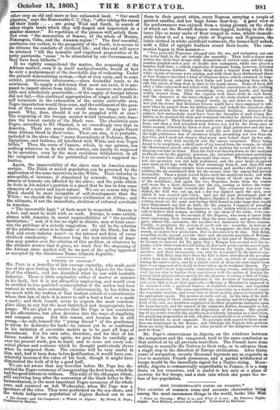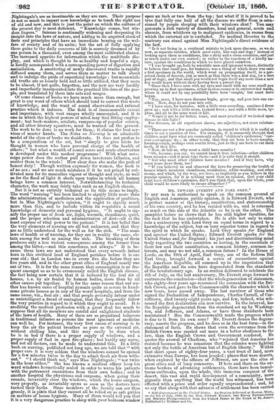HISS NIGHTINGALE'S NOTES ON NURSING. * THE exercise of common sense
and accurate observation being among the most uncommon things in the world, books like Miss • Notes on Nursing : What it is, and What it is not. By Florence Night- tingale. New Edition, revised and enlarged. Published by Harrison. Nightingale's are as inestimable as they are rare. Their purpose is not so much to impart new knowledge as to teach the right use of old and new, and this is just the point on which the culture of the present day is most deficient. "Knowledge comes, but wis- dom lingers." Science is continually widening and deepening its insight into the laws of nature, and adding to its acquired stock of 'feats and principles that have an immediate bearing on the wel- fare of society and of its units; but the art of fully applying these gains to the daily concerns of life is scarcely dreamed of by one person in a thousand, even among the most cultivated classes. The increased appetite for information which the multitude dis- play, and which is thought to be so healthy and hopeful a sign, is hardly accompanied with a corresponding power of digestion and assimilation.. A smattering of newly discovered truths is rapidly :diffused among them, and serves them as matter to talk about and to indulge the pride of superficial knowledge ; but meanwhile old truths are so loosely held and so little utilised, that they seem to be almost, if not quite, forgotten, and the new are very tardily and imperfectly incorporated into the practical life-lore of the peo- ple, and translated by them into acts and usages.
Of some classes of books we have much more than enough, but great is our want of others which should tend to correct this waste of knowledge, and the want of sound observation and rational practice which it induces. The field is of immeasurable extent and importance, with vast ranges wholly unoccupied, and it is -one in which the highest powers of mind may find fitting employ- ment; but book-makers, seiolists, vampers-up of popular science, and all other literary squatters, must be warned off the ground. The work to be done is no work for them ; it claims the best ser- vices of master hands. The Notes on Nursing is an admirable model of the class of books we desiderate. It does not profess to be a compendium of the art, but "simply to give hints for thought to women who have personal charge of the health of others;" but what a wealth of sound sense and acute observation is developed under this modest programme ! With what sove- reign power does the author pull down inveterate fallacies, and scatter them to the winds ! How clear does she make the path of honest duty ! Though written expressly for women, the book is of no sex; and we are much mistaken if it be not prized by cul- tivated men for its masculine vigour of thought and style, as well as for the flood of light it sheds upon topics in which all human beings have a common interest. Notwithstanding its technical character, the work may fairly take rank as an English classic. But it is not so entirely technical as its title seems to imply. The word "nursing" has been limited to signify little more than the administration of medicines and the application of poultices, but in Miss Nightingale's opinion, "it ought to signify much more than this, and, to include within its requisites a sound knowledge of domestic and personal hygiene. "It ought to sig-
the proper use of fresh air, light, warmth, cleanliness, quiet, and the proper selection and administration of diet—all at the least expense of vital power to the patient." It is her belief that the very elements of nursing are all but unknown, and that they axe as little understood for the well as for the sick. "The same laws of health or of nursing, for they are in reality the same, ob- tain among the well as among the sick. The breaking of them produces only a less violent consequence among the former than among the latter,—and this sometimes, not always." It is be- cause these laws are not understood that every seventh infant born in this civilized land of England perishes before it is one year old; that in London two in every five die before they are five years old, and in the other great cities of England nearly one out of two. It is for the same reason that consumption is so fre- quent amongst us as to be erroneously called the English disease, the fact being now certain that it is induced by the foul air of houses, i.e. by air fouled by human bodies, more than by all other causes put together. It is for the same reason that our au- thor has known cases of hospital pytemia quite as severe in hand- some private houses as in any of the worst hospitals, and from the same cause, viz., foul air ; and that people generally labour under so unintelligent a dread of contagion, that they frequently follow the very practice in regard to it which they ought to avoid. It is -crediting the medical profession with a great deal too much to suppose that all its members are candid and enlightened students of the laws of health. Many of them are as prejudiced believers in traditional fallacies as persons the most ignorant of medicine can well be. For instance, the very first canon of nursing is to keep the air the patient breathes as pure as the external air, without chilling him, and this may easily be done when he is in bed if there is a proper supply of windows, and a proper supply of fuel in open -fire-places; but hardly any nurse, and not all doctors, can be made to understand this. In a little book on nursing, published not long ago, we are told that "with proper care it is very seldom that the windows cannot be opened -for a few minutes twice in the day to admit fresh air from with- out." "I should think not," says Miss Nightingale ; "nor twice In the hour either." She has known a medical officer keep his ward windows hermetically sealed in order to warm his patients with the putrescent emanations from their own bodies ; and in another hospital the physicians and surgeons, when going their rounds, invariably close the windows, -which the house surgeon, very properly, as invariably opens as soon as the doctors have turned their backs. Since members of the faculty can err thus
• grossly, it is plain that they cannot all be relied on as safe guides on matters of house hygiene. Many of them would tell you that it is a very dangerous practice to sleep withyour bedroom window
open an inch or two from the top ; but what if it is proved to be true that fully one half of all the disease we suffer from is oeea- sioned by people sleeping with their windows shut? You may generate a rich variety of disorders local and general, acute and chronic, from whitlows up to malignant epidemics' in rooms from which the external air is excluded. No medical theories to the contrary can stand against Miss Nightingale's direct evidence of 'the fact.
"Is it not living in a continual mistake to look upon diseases, as we do now, as separate entities, which must exist, like cats and dogs ? instead of looking upon them as conditions, like a dirty and a clean condition, and just as much under our own control ; or rather as the reactions of a kindly na- ture, against the conditions in which we have placed ourselves.
"I was brought up, both by scientific men and ignorant women, distinctly to believe that small pox, for instance, was a thing of which there was once a first specimen in the world, which went on propagating itself, in a per- petual chain of descent, just as much as that there was a first dog, (or a first pair of dogs), and that small pox would not begin itself any more than a new dog would begin without there having been a parent dog. "Since then I have seen with my eyes and smelt with my nose small pox growing up in first specimens, either in close rooms or in overcrowded wards, where it could not by any possibility have been caught,' but must have begun. • "Nay, more, I have seen diseases begin, grow up, and pass into one an- other. Now, dogs do not pass into cats.
"I have seen, for instance, with a little over-crowding' continua fever grow up ; and with a little more, typhoid fever ; and with a little more, ty- phus, and all in the same ward or hut. "Would it not be far better, truer, and more practical if we looked upon disease in this light ? For diseases, as all experience shows, are adjectives, not noun substan- tives.
"There are not a few popular opinions, in regard to which it is useful at times to ask a question or two. For example, it is commonly thought that children must have what are commonly called childien's epidemics,' 'cur- rent contagions,' &c.; in other words, that they are born to have measles, hooping-cough, perhaps even scarlet fever, just as they are born to cut their teeth, if they live. "Now, do tell us, why must a child have measles ? "Oh, because, you say, we cannot keep it from infection—other children have measles—and it must take them—and it is safer that it should.
"But why must other children have measles ? And if they have, why must yours have them, too ? "If you believed in and observed the laws for preserving the health of houses which inculcate cleanliness, ventilation, white-washing, and other means, and which, by the way, are laws, as implicitly as you believe in the popular opinion, for it is nothing more than an opinion, that your child must have children's epidemics, don't you think that, upon the whole, your child would be more likely to escape altogether ? "



























 Previous page
Previous page